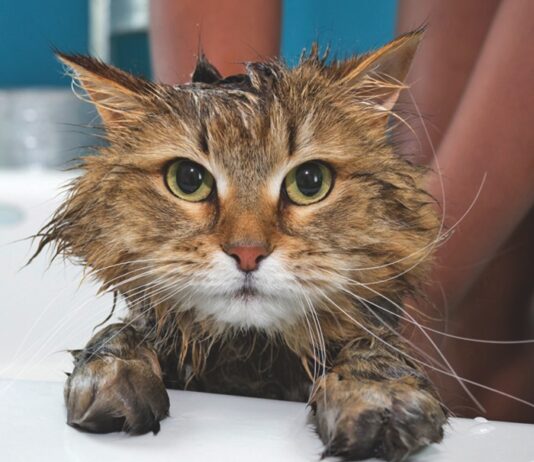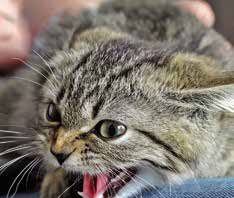Has Your Cat Become Aggressive?
We all know people that we try to avoid, but what if your cat develops an unpleasant attitude? What if one cat attacks another in your home, or even your dog — or even you? Territoriality and fear are usually the causes. Luckily, both can be controlled with some patience and understanding. Cats don’t plan these unpleasant behaviors to bother you. They aren’t plotting ways to punish you, either. “It’s more likely that your cat is saying, ‘Hey, this is my house,’” explains Katherine Houpt, VMD, PhD, and the emeritus James Law professor of Behavior Medicine at Cornell University’s College of Veterinary Medicine.
Taking Your Cat For a (Car) Ride
Do you simply dread the thought of taking a car trip with your cat? First, you must be clever enough to catch the wily feline. Then — after she is safely in her carrier — you must brace yourself for the wailing and thrashing that will begin either from the moment of capture or, at the very latest, once the car begins to roll. And where are you heading? To the veterinary hospital, probably. Afterwards, you breathe a sigh of relief — knowing that you likely won’t have to go through this again until the next visit. So why do our cats behave this way? Well, imagine if you were a child and were rather intimidated by your aunt Jean. Though you rarely traveled by bus, once each year, you and your family boarded a bus to aunt Jean’s. Maybe you too kicked and screamed, struggling to avoid getting onto the bus. You more than likely cried or complained during the journey as well. As for bus trips? The mere suggestion might send you running.
Ask Elizabeth: July 2011
Dear Elizabeth: I have four cats in my household and one of them, Tabitha, has a tendency to chew and eat plastic. Ive caught her chewing on plastic bags that Ive carried in from the store, as well as items in the basement that are wrapped in plastic. I worry that she could choke to death or hurt herself somehow. Why does she do this? One of my other cats is aggressive and chases her. Tabitha is afraid and will not fight back; could her plastic obsession be stress-related? Any ideas of what I can do?
Less Stressful Vet Visits
The American Association of Feline Practitioners (AAFP) and the International Society of Feline Medicine (ISFM) have released the Feline Friendly Handling Guidelines. These guidelines were developed by a panel of experts to create a less stressful experience for cat patients while meeting their medical needs. The Feline Friendly Handling Guidelines - endorsed by American Animal Hospital Association (AAHA) - were developed to provide the best care for cats and to increase vet visits.
Is It Urine Marking or Incontinence?
When a cat begins soiling the house, it is usually assumed that it is a behavioral problem or the onset of senility. However, there are several medical conditions that can cause urinary incontinence and inappropriate urination, some of which require immediate treatment. First, it is important to distinguish between incontinence and inappropriate urination. True incontinence occurs when a cat does not have voluntary control over urination; trauma, a weak primary sphincter muscle and congenital abnormalities are the most common causes of incontinence.
How to Curb Destructive Scratching
Just days after youve invested in new furniture, your cat decides she really loves it, too. Its the place shes chosen to give herself a pedicure, and soon the arms of that beautiful new sofa look like theyve gone through a shredder. You may notice your cat flexing her nails when she first gets up and stretches or suddenly stop to sink her nails into the wall-to-wall carpeting as she crosses a room. She may scratch at the end of a burst of energy after playing with her favorite toy. Fabrics, carpet, wood, cardboard there are numerous materials in your house that can soon become a target for your cats clawing.
Is It Really a Mothers Love?
If anyone has learned to accept the empty nest syndrome, its the mother cat who watches her kittens leave one by one by at about 12 weeks or so - either through adoption or by wandering off to fend for themselves. So its interesting to see how mother cats and their kittens behave when they remain together in the same household. Sibling Rivalry? "The least amount of conflict occurs with cats that have been brought up together," says Katherine A. Houpt, VMD, the emeritus James Law Professor of Animal Behavior at Cornell Universitys College of Veterinary Medicine. "Feline siblings often become friends in the household."
How to Foil the Feline Houdini
Here are ways to prevent your cat from making that mad dash out the door.
Research Says: Stress Can Make Our Cats Sick
According to a recent Ohio State University, our pets can get sick from stress - just like us. The study found that otherwise healthy cats show signs of illness when stressed. And cats diagnosed with feline interstitial cystitis (FIC) became healthier when stress levels were reduced, the study showed. Twelve of the 32 cats in the three-year study were healthy, while 20 had FIC, a chronic pain syndrome that affects the cats bladder. According to researchers, lower urinary tract diseases occur in about 1.5 percent of house cats, and many pet owners cant tolerate the mess that accompanies it. As a result, millions of sick cats are put down or relinquished to shelters every year.
When Your Cat Dislikes Company
When Safflower, a 12-week-old female kitten, earnestly beckoned from her cage in a Manhattan animal shelter, Deirdre knew she was the one for her. The kitten settled in quickly with Deirdre and her two roommates in a small apartment. Safflower loved everyone; Deirdre was even jealous when Safflower would occasionally sleep on her roommates beds instead of her own. The growing kitten played and romped with visitors, and even greeted people at the door.
Twos Company Sometimes
Cats are naturally solitary creatures; in addition, they are also naturally independent and self-sufficient traits that we alter and/or suppress when we domesticate them. The idea of a second cat can be very alluring: "One cat is so entertaining and such a wonderful companion
two would be twice the fun!" Or, "I want to do my part to ease the burden on my local shelter and give one more cat a good home." These are common thoughts for cat owners and may, in fact, be true; however, the decision to add a second feline family member should not be taken lightly. A second cat can either add joy and companionship, or it can add strife and mayhem.
Twos Company – Sometimes
Cats are naturally solitary creatures; in addition, they are also naturally independent and self-sufficient - traits that we alter and/or suppress when we domesticate them. The idea of a second cat can be very alluring: "One cat is so entertaining and such a wonderful companion … two would be twice the fun!" Or, "I want to do my part to ease the burden on my local shelter and give one more cat a good home." These are common thoughts for cat owners and may, in fact, be true; however, the decision to add a second feline family member should not be taken lightly. A second cat can either add joy and companionship, or it can add strife and mayhem.














